Baker Academic New Testament Studies Collection (30 vols.)
Digital Logos Edition
Overview
Enhance your New Testament understanding with the Baker Academic New Testament Studies Collection. This library’s 30 volumes of sound, recent scholarship give you fresh insight into essential New Testament topics. Several volumes focus on New Testament interpretation; they provide a look at the Gospel’s historical, theological, literary, narrative, and social elements. This collection offers a glimpse into the lives, works, and ministries of Christ’s apostles—Simon Peter, Matthew, Mark, Luke, and John. It also focuses on oft-debated topics, including divorce, the Synoptic problem, Lukan pneumatology, violence, and textual criticism.
This title is included in the following collections
You can save when you purchase this product as part of a collection.
Baker Academic New Testament S...
$1,299.99$1,299.99Baker Academic Biblical Studie...
$3,999.99$3,999.99Baker Ultimate Collection 2022...
$38,273.89$30,599.99

Key Features
- Analyzes various methods of biblical interpretation
- Contains insights from various New Testament scholars
- Illustrates the contemporary relevance of the New Testament
Product Details
- Title: Baker Academic New Testament Studies Collection
- Publisher: Baker Academic
- Volumes: 30
- Pages: 10,285
- Resource Types: Topical, Synopsis/Survey
- Topic: New Testament Biblical Studies
Individual Titles
- The New Testament: A Historical and Theological Introduction by Donald A. Hagner
- Simon Peter in Scripture and Memory: The New Testament Apostle in the Early Church by Markus Bockmuehl
- Reading the Gospels Wisely: A Narrative and Theological Introduction by Jonathan T. Pennington
- The Text of the New Testament: From Manuscript to Modern Edition by J. Harold Greenlee
- Killing Enmity: Violence and the New Testament by Thomas R. Yoder Neufeld
- The Charismatic Theology of St. Luke: Trajectories from the Old Testament to Luke–Acts, 2nd ed., by Rogert Stronstad
- Matthew: Storyteller, Interpreter, Evangelist, rev. ed., by Warren Carter
- Mark: Storyteller, Interpreter, Evangelist by Francis J. Moloney
- John: Storyteller, Interpreter, Evangelist by Warren Carter
- Theology of the New Testament by Udo Schnelle
- Scripture as Communication: Introducing Biblical Hermeneutics by Jeannine K. Brown
- New Testament Commentary Survey, 7th ed., by D.A. Carson
- Can We Still Believe the Bible? by Craig Blomberg
- Love in the Gospel of John by Francis J. Moloney
- Gospels and Tradition: Studies on Redaction Criticism of the Synoptic Gospels by Robert H. Stein
- Studying the Synoptic Gospels: Origin and Interpretation by Robert H. Stein
- The Spirit in the Gospels and Acts by Craig Keener
- . . . And Marries Another: Divorce and Remarriage in the Teaching of the New Testament by Craig Keener
- New Testament Survey by Robert G. Gromacki
- Introducing the New Testament: A Historical, Literary, and Theological Survey by Mark Allen Powell
- The King in His Beauty: A Biblical Theology of the Old and New Testaments by Thomas R. Schreiner
- Scripture and Tradition: What the Bible Really Says by Edith M. Humphrey
- From Prophecy to Testament: The Function of the Old Testament in the New edited by Craig A. Evans
- New Testament Textual Criticism: A Concise Guide by David Alan Black
- New Testament Theology: Magnifying God in Christ by Thomas R. Schreiner
- Rethinking the Synoptic Problem edited by David A. Black and David R. Beck
- Making Sense of the New Testament: Three Crucial Questions by Craig L. Blomberg
- Gospel of Glory: Major Themes in Johannine Theology by Richard Bauckham
- The Kingdom according to Luke-Acts: A Social, Literary, and Theological Introduction by Karl Allen Kuhn
- Conversion in Luke-Acts: Divine Action, Human Cognition, and the People of God by Joel B. Green
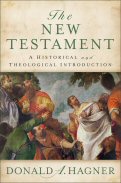
The New Testament: A Historical and Theological Introduction
- Author: Donald A. Hagner
- Publisher: Baker Academic
- Publication Date: 2012
- Pages: 848
This substantial introduction explores the origin and character of the New Testament writings. Donald Hagner deals with the New Testament both historically and theologically, employing the framework of salvation history. He treats the New Testament as a coherent body of texts and stresses the unity of the New Testament without neglecting its variety. Although the volume covers typical questions of introduction—such as author, date, background, and sources—it focuses primarily on understanding the theological content and meaning of the texts.
Throughout this capstone work, Hagner delivers balanced conclusions in conversation with classic and current scholarship, making this an essential resource for seminarians, graduate students, and upper-divisional undergraduates for study and lifelong reference. The book includes summary tables, diagrams, maps, and extensive bibliographies.
Donald A. Hagner is the George Eldon Ladd Emeritus Professor of New Testament and the senior professor of New Testament at Fuller Theological Seminary. He is the author of Encountering the Book of Hebrews, The Jewish Reclamation of Jesus, New Testament Exegesis and Research: A Guide for Seminarians, and commentaries on Hebrews and Matthew. Hagner is also coeditor of the New International Greek Testament Commentary and an ordained minister in the American Presbyterian Church.
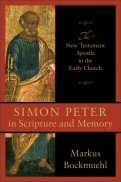
Simon Peter in Scripture and Memory: The New Testament Apostle in the Early Church
- Author: Markus Bockmuehl
- Publisher: Baker Academic
- Publication Date: 2012
- Pages: 240
After Jesus, Peter is the most frequently mentioned individual in both the Gospels and the New Testament as a whole, yet we know very little about this formative early-church figure. Markus Bockmuehl introduces the New Testament Peter by asking how first- and second-century sources may be understood through the prism of “living memory” among the disciples of the apostolic generation and the students of those disciples. He argues that early Christian memory of Peter underscores his central role as a bridge-building figure holding together the diversity of first-century Christianity. Drawing on more than a decade of research, Bockmuehl applies cutting-edge scholarship to the question of the history and traditions of Simon Peter. New Testament students and professors will value Bockmuehl’s fresh insight into the biblical witness and early Christian tradition.
Bockmuehl has long distinguished himself as a careful historian, sensitive to both Jewish and Greco-Roman dimensions of the early Christian movement and a sensitive reader of literary texts. This well-written and ecumenically sensitive volume draws on all of his impressive skills. New insights abound regarding the portrayal of Peter in the New Testament and in nonbiblical sources from the second century.
—Gary Anderson, Hesburgh Professor of Catholic Theology, University of Notre Dame
Markus Bockmuehl is a Keble College fellow and a professor of biblical and early Christian studies at the University of Oxford. He previously taught at the University of Cambridge and the University of St. Andrews. Bockmuehl is the author or editor of numerous books, including Seeing the Word, Scripture’s Doctrine and Theology’s Bible, Paradise in Antiquity: Jewish and Christian Views, and Redemption and Resistance: The Messianic Hopes of Jews and Christians in Antiquity.
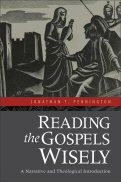
Reading the Gospels Wisely: A Narrative and Theological Introduction
- Author: Jonathan T. Pennington
- Publisher: Baker Academic
- Publication Date: 2012
- Pages: 288
In Reading the Gospels Wisely, Jonathan Pennington examines the theological and ethical aims of the Gospel narratives, helping students see the fruit of historical and literary study. He contends that we can learn to read the Gospels well from various vantage points, among them the premodern, modern, and postmodern.
This textbook can stand on its own as a guide to reading the Gospels as Scripture. It is ideally suited to supplement conventional textbooks that discuss each Gospel systematically. Most textbooks tend to introduce students to historical-critical concerns but may be less adequate for showing how the Gospel narratives, read as Scripture within the canonical framework of the entire New Testament and the whole Bible, yield material for theological reflection and faithful practice. Pennington neither dismisses nor duplicates the results of current historical-critical work on the Gospels as historical sources. Rather, he offers critically aware and hermeneutically intelligent instruction in reading the Gospels in order to hear their witness to Christ in a way that supports Christian application and proclamation. This text will appeal to professors and students in Gospels, New Testament survey, and New Testament interpretation courses.
This is a book that could transform many people’s reading of the Gospels. Jonathan Pennington has a wide knowledge of the specialist literature, and he skillfully distills what matters most for the task of reading the Gospels wisely. He is especially concerned that we read the Gospels in ways that are appropriate to the sort of texts they are. What comes across is a powerful sense that the Gospels are not only historical but also life-changing.
—Richard Bauckham, emeritus professor of New Testament studies, University of St. Andrews
Jonathan T. Pennington is an associate professor of New Testament interpretation at the Southern Baptist Theological Seminary in Louisville, Kentucky. The author of Heaven and Earth in the Gospel of Matthew, he has published a number of biblical language–learning tools, including New Testament Greek Vocabulary and Old Testament Hebrew Vocabulary.
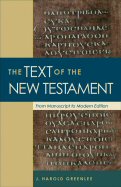
The Text of the New Testament is a brief introduction for the layperson to the New Testament’s origins. It describes the basics of ancient writing tools, manuscripts, the work of scribes, and how to think about differences in what the various manuscripts say. Geared to the layperson uninformed or confused about textual criticism, Greenlee’s book explains the production of ancient manuscripts and traces the New Testament’s textual development. Readers are introduced to the basic principles of textual criticism, the concept of variant readings, and how to determine which variant has the greatest likelihood of being the original reading. To illustrate the basic principles, several sample New Testament texts are examined. The book concludes by putting textual criticism in perspective as involving only a minute portion of the entire New Testament text—the bulk of which is indisputably attested by the manuscripts.
Greenlee takes the reader on an illustrated journey from the pens of the apostles to the printing press and beyond. It’s as rare as it is refreshing to read such a sane book that rises above the cluttered traffic and confusing signals on the information highway.
—Daniel B. Wallace, professor of New Testament studies, Dallas Theological Seminary
J. Harold Greenlee was a professor of New Testament Greek, a missionary with OMS International, and an international translation consultant with Wycliffe Bible Translators. He authored A Concise Exegetical Grammar of New Testament Greek.
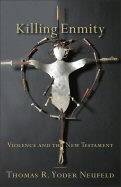
Violence is a persistent, prominent, and troubling feature of human existence. The usual understanding of violence involves physical attack. More broadly, violence can be understood as any kind of intentional harm, whether verbal, physical, or emotional, individual or collective. Pastors, theologians, and Christian leaders of all kinds may be called on to apply the message of the New Testament in situations of violence. But what is that message? The New Testament writers speak often of peace, but what do they have to offer in response to violence? Or does the New Testament, centering as it does on the crucifixion of its central character, perpetuate rather than alleviate the problem of violence?
In this book, Thomas Yoder Neufeld mines classic New Testament texts such as the Sermon on the Mount (or Plain), the cleansing of the temple, the “armor of God,” and the Revelation of John. He also addresses more generally the rhetoric of violence: metaphors and thought patterns that may reflect the violence of first-century Roman imperial reality.
Taking his cue from the ironic wording in Ephesians 2:16, which credits Christ with “killing the enmity” in his own body through his death on the cross, Yoder Neufeld asks whether and how the violent death of the nonviolent Jesus points to the ultimate overcoming of all wrongs, and all violence, by the good and saving God in whom he trusted.
Thomas Yoder Neufeld considers many of the New Testament’s texts that might implicitly or explicitly condone violence of one kind or another. Though he concludes that these texts actually subvert violence, he does so without avoiding the very difficult questions they raise. Readers will be both disturbed and challenged by this timely book.
—Michael J. Gorman, Raymond E. Brown Chair in Biblical Studies and Theology, St. Mary’s Seminary & University
Thomas R. Yoder Neufeld is a professor of religious studies and theological studies at Conrad Grebel University College at the University of Waterloo, Ontario. He is the author of numerous articles and several books, including Recovering Jesus: The Witness of the New Testament and a commentary on Ephesians.
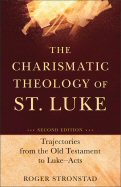
The Charismatic Theology of St. Luke: Trajectories from the Old Testament to Luke–Acts
- Author: Rogert Stronstad
- Edition: 2nd
- Publisher: Baker Academic
- Publication Date: 2012
- Pages: 144
What is the meaning of the Holy Spirit’s activity in Luke-Acts, and what are its implications for today? Roger Stronstad offers a cogent and thought-provoking study of Luke as a charismatic theologian whose understanding of the Spirit was shaped wholly by his understanding of Jesus and the nature of the early church. Stronstad locates Luke’s pneumatology in the historical background of Judaism and views Luke as an independent theologian who makes a unique contribution to the pneumatology of the New Testament. This work challenges traditional Protestants to reexamine the impact of Pentecost and explores the Spirit’s role in equipping God’s people for the unfinished task of mission. The second edition has been revised and updated throughout and includes a new foreword by Mark Allan Powell.
In my opinion, Roger Stronstad’s The Charismatic Theology of St. Luke is perhaps the most important biblical studies book ever written by a Pentecostal. Truly a seminal work, this slim volume caused a seismic shift in the terrain of Pentecostal biblical scholarship, changing forever its fundamental character while sending tremors beyond the tradition in all directions. I am delighted that this exceedingly important piece will continue its well-deserved shelf life, extending its availability for readers old and new. My commendation to Baker Academic for issuing this valuable new edition.
—John Christopher Thomas, Clarence J. Abbott Professor of Biblical Studies, Pentecostal Theological Seminary
Roger Stronstad is an associate professor in Bible and theology at Summit Pacific College in Abbotsford, British Columbia. He is the author of many articles and six books, including The Prophethood of All Believers: A Study in Luke’s Charismatic Theology. Strongstad also coedited Life in the Spirit New Testament Commentary.
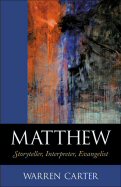
For many years, the well-received first edition of this commentary has offered readers a way to look at scriptural texts that combines historical, narrative, and contemporary interests. Carter explores Matthew by approaching it from the perspective of the “authorial audience”—by identifying with and reading along with the audience imagined by the author. This newly updated second edition focuses on Matthew as storyteller, interpreter, and evangelist. It preserves the essential identity of the original material, while adding new insights from Carter’s more recent readings of Matthew’s Gospel in relation to the Roman Imperial world.
Four of the seventeen chapters have been significantly revised, and most have had minor changes. There are also new endnotes directing readers to Carter’s more recent published work on Matthew. Scholars and pastors will use the full bibliography and appendix on redaction and narrative approaches, while lay readers will appreciate the clear and straightforward text.
With a deft touch and an eye for detail, Carter invites the reader to follow him on a well-planned literary tour of the world of Matthew’s Gospel and its story of Jesus. To begin the tour, Carter acquaints the reader with the social and cultural circumstances of Matthew’s author and audience and then shows the reader the heart of Matthew’s story as he discusses its viewpoint, plot, settings, and characters. To conclude the tour, Carter relates Matthew’s gospel-proclamation to various aspects of contemporary religious experience. Writing for students, ministers, and scholars alike, Carter demonstrates a fine mastery of both historical and literary methods. His book will be touted as a worthy contribution to Matthean studies.
—Jack Dean Kingsbury, emeritus professor of biblical theology, Union Theological Seminary
Warren Carter is a professor of New Testament at Brite Divinity School, Texas Christian University. He is the author of many books, including John: Storyteller, Interpreter, Evangelist, The Roman Empire and the New Testament, Matthew and Empire, John and Empire, and Matthew and the Margins.
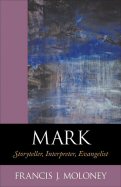
The earliest and briefest of the four Gospels has traditionally been ascribed to a disciple named Mark. In some ages, it been overshadowed by its lengthier New Testament neighbors, but its pages hold rich rewards for those who ask the right questions. Who was “Mark,” and what were his purposes—historical, theological, or otherwise? How does he shape his story of Jesus, and what interpretation of the origins of Christianity does that shaping reveal? What is his understanding of his central character, Jesus of Nazareth? And what abiding value does Mark’s story hold for those who read this “good news” as a key part of the charter of the Christian church in its life today?
Seminarians, students, pastors, and readers seeking an introduction to the Gospel of Mark through the lens of sensitive literary, historical, and theological scholarship need look no further. In Mark: Storyteller, Interpreter, Evangelist, Francis J. Moloney offers the fruits of top-level biblical scholarship in a broadly accessible format. Students and professors alike will appreciate and profit from his fresh and lucid presentation of the message of one of the Christian faith’s earliest and most enigmatic proponents and the inventor of its most revered literary genre.
If you are seeking a reliable and engaging introduction to the Gospel of Mark, look no further. Moloney’s work presents students and pastors, as well as scholars, with a reliable account of how the Gospel of Mark became such a central text in contemporary New Testament studies, and it offers as an engaging reading of the Markan story that opens new vistas. Moloney provides a thorough study of Markan Christology and ecclesiology, and his final chapter, ‘The Good News of Human Failure,’ is the most insightful statement of Mark’s accomplishment I have read. Clearly written and always compelling in its presentation, Mark: Storyteller, Interpreter, Evangelist is the perfect introduction to a serious reading of the Markan Gospel. Carefully researched and based on an insightful reading of the Gospel text, it will remain a staple of Markan studies for years to come.
—Frank J. Matera, professor of New Testament, The Catholic University of America
Francis J. Moloney is the emeritus senior professorial fellow at Australian Catholic University, Melbourne. He formerly served as dean of the School of Theology and Religious Studies at Catholic University of America and as provincial superior of the Salesians of Don Bosco for Australia and the Pacific region. He is the author of many books, including The Gospel of John: Text and Context.
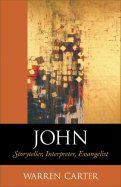
John: Storyteller, Interpreter, Evangelist is an accessible introduction to the Fourth Gospel. This book examines three aspects of John’s Gospel: John’s telling of the story of Jesus, his interpretation of Jesus for his readers, and his formulation of all of this into the Gospel of Jesus.
Carter surveys the central issues of this Gospel and engages with narrative and historical approaches, the two dominant methods used in interpreting John’s Gospel. He introduces his readers to consider the Gospel’s negotiation of the Roman Imperial world.
This book is written for college and seminary students, clergy seeking resources for teaching and preaching, and laity—especially Bible study groups that like to engage a topic in some depth.
The adage that the Gospel of John is a pool in which a child can wade and an elephant can swim is repeated often. While John is widely accessible on a superficial level, it demands a great deal if one is to read it perceptively. Warren Carter provides serious readers with a thorough orientation to the Gospel, leading students of the Gospel into its literary, historical, and theological facets while providing an overview of key figures and contributions in Johannine scholarship. Everyone needs a guide when entering unfamiliar territory, and, for the adventurous, Carter is surefooted, reliable, and insightful. Those who follow his lead will quickly find John to be a source of endless fascination.
—R. Alan Culpepper, dean, James and Carolyn McAfee School of Theology
Warren Carter is a professor of New Testament at Brite Divinity School, Texas Christian University. He is the author of many books, including Matthew: Storyteller, Interpreter, Evangelist, The Roman Empire and the New Testament, Matthew and Empire, John and Empire, and Matthew and the Margins.
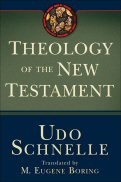
The crowning achievement for students of the New Testament is to grasp the whole while discerning the parts, to derive contemporary theological meaning without compromising historical accuracy, to respect the integrity of the ancient texts while interpreting validly within the structures of modern and postmodern consciousness. But how is it possible to communicate the diversely expressed faith of ancient Mediterranean fishermen and tentmakers in a crucified Jewish messiah to the academy and the church of the globalized and pluralized twenty-first century?
In Theology of the New Testament, Udo Schnelle—master teacher, deft exegete, committed churchman, and fully attuned contemporary intellectual—takes up this challenge with extraordinary energy and intelligence. The result is a capstone volume that puts all the pieces together both for students who read it straight through and for professors, theologians, pastors, and others who work through it at their own pace. For all who read it, the book will become a standard reference, a reliable source not only for summaries of particular New Testament books and topics but also for a refreshed and deepened perception of how a transcendent message has been uttered through temporally and spatially fixed actions and words.
The translation, prepared by a leading American scholar who knows the author well and shares similar qualifications and commitments, achieves the literary quality of an original English composition while conveying accurately the sense of the original German and adding bibliographic adaptations for English-language readers.
Schnelle’s Theology of the New Testament is, in my view, perhaps the most methodologically sophisticated and theologically significant contribution to the genre in the past 20 years. ‘Jesus of Nazareth: The Near God’ is the common center for his informed and insightful elaboration of the thought of New Testament theology in the context of a contemporary understanding of reality. The author’s critical acumen and theological sensitivity, as well as his obvious control of both primary and secondary literature, make this book a necessary addition to the library of every serious student of the New Testament and an ideal text for advanced courses.
—David E. Aune, Walter Professor of New Testament and Christian Origins, University of Notre Dame
Udo Schnelle is a professor of New Testament at the University of Halle in Germany. He is the author of numerous works, including Apostle Paul: His Life and Theology, translated by M. Eugene Boring.
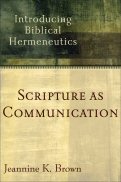
Jeannine Brown believes that communication is at the heart of what we do when we open the Bible—that we are actively engaging God in a conversation that can be life changing. In this basic guide to the theory and practice of biblical hermeneutics, Brown proposes a communication model as an effective approach to interpreting the Bible. Drawing upon thinkers such as Kevin Vanhoozer, Nicholas Wolterstorff, and Anthony Thiselton, she first explicates and then demonstrates how such a model can enhance our ability to understand Scripture. Brown’s fresh, engaging voice comes through in this clearly written guide for professors, students, and church leaders.
Brown has written an excellent text for hermeneutics classes that is clear and well organized and reveals a superb mastery of the material. Understanding texts as a form of communication rather than as art is a helpful correction to recent trends in interpretation.
—Robert H. Stein, senior professor of New Testament interpretation, Southern Baptist Theological Seminary
Jeannine K. Brown is a professor of New Testament at Bethel Seminary and is the author of The Disciples in Narrative Perspective. She contributed to The Baker Illustrated Bible Commentary and has written for such publications as Journal of Biblical Literature and Catholic Biblical Quarterly.
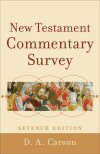
Highly respected New Testament scholar D.A. Carson provides students and pastors with expert guidance on choosing a commentary for any book of the New Testament. The seventh edition has been updated to assess the most recently published commentaries. Carson examines series, one-volume commentaries, and New Testament introductions and theologies, evaluating the available offerings for each New Testament book. This is an essential guide to building a reference library.
An incredibly informative and wonderfully fun book. There is an extraordinary amount of information packed into its pages, and the fun comes from considering one’s own preferences and then alternately agreeing or disagreeing with Carson’s comments. . . . This book will be of continued benefit to theological students.
—Paul Foster, Journal for the Study of the New Testament
D.A. Carson is research professor of New Testament at Trinity Evangelical Divinity School. He is author or editor of numerous books, many of which are found in the D.A. Carson “Love of God” Collection.
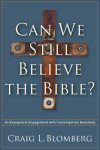
Challenges to the reliability of Scripture are common today. Distinguished biblical scholar Craig Blomberg offers an accessible and nuanced argument for the Bible’s reliability in response to the extreme views about Scripture and its authority articulated by both sides of the debate. He believes that a careful analysis of the relevant evidence shows we have reason to be more confident in the Bible than ever before. As he traces his own academic and spiritual journey, Blomberg sketches out the case for confidence in the Bible in spite of various challenges to the trustworthiness of Scripture, offering a positive, informed, and defensible approach.
Mention the Bible, especially a hot topic like canon or miracles, and one second later you will hear strident voices attacking the Bible’s silliness or calling others names for not believing the Bible. Those topics, and many more besides, are volatile because they matter, and what matters most for the discussion is the voice of reason and balance. Enter Craig Blomberg with nothing less than a splendid example of ‘generous apologetics’ for the faith. Whether you agree on specific points, this is the finest example I know of for how to defend the Bible.
—Scot McKnight, professor of New Testament, Northern Seminary
Craig Blomberg is distinguished professor of New Testament at Denver Seminary, where he has been teaching since 1986. Blomberg earned degrees from Augustana College, Trinity Divinity School, and Aberdeen University in Scotland. He previously taught at Palm Beach Atlantic College and spent one year in Cambridge as a research fellow with Tyndale House. He has been on translation committees for the New Living Translation, English Standard Version, and the Holman Christian Standard Bible.
Bloomberg is the author, coauthor, or coeditor of numerous books and more than 80 articles in journals or multiauthor works. A recurring topic of interest in his writings is the historical reliability of the Scriptures, and he has also covered such diverse issues as wealth and poverty, hermeneutics, and women in ministry. His books include Jesus and the Gospels: An Introduction and Survey, 2nd ed., Zondervan Exegetical Commentary on the New Testament: James, A Handbook of New Testament Exegesis, Making Sense of the New Testament, Preaching the Parables, and The NIV Application Commentary: 1 Corinthians.
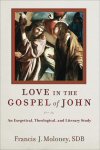
The command to love is central to the Gospel of John. This capstone work on John’s Gospel uses a narrative approach to delve deeply into the theme at the heart of the Fourth Gospel and the life of the Christian church. Uniting rigorous exegesis with theological and pastoral insight, Love in the Gospel of John makes a substantive contribution to contemporary Johannine scholarship. Internationally respected scholar Francis J. Moloney offers a thorough exploration of this theme, focusing not only on Jesus’ words but also on his actions. Instead of merely telling people that they must love one another, Jesus acts to make God’s love known and calls all who follow him to do the same.
Francis J. Moloney is one of the most distinguished Catholic scholars of John’s Gospel in the English-speaking world today. In his latest work on the Fourth Gospel, he displays his fine gifts as an able teacher. Having absorbed a vast amount of literature on the topic of love in John’s Gospel, he presents his own argument in a clear, orderly form that even the uninitiated can grasp.
—John P. Meier, Warren Chair Professor of Theology, University of Notre Dame
Francis J. Moloney is the emeritus senior professorial fellow at Australian Catholic University, Melbourne. He formerly served as dean of the School of Theology and Religious Studies at Catholic University of America and as provincial superior of the Salesians of Don Bosco for Australia and the Pacific region. He is the author of many books, including Mark: Storyteller, Interpreter, Evangelist.
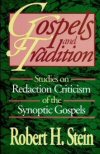
Follow revered scholar Robert Stein as he demonstrates the ability of redaction or source criticism to clarify the message and teaching of the New Testament. Using Mark as a laboratory, Stein identifies the most profitable ways redaction criticism can be used, while also distinguishing between proper and improper usage.
Robert H. Stein was senior professor of New Testament interpretation at Southern Baptist Theological Seminary. He previously taught at Bethel Seminary. A world-renowned scholar of the Synoptic Gospels, he is the author of several books, including Jesus the Messiah, Mark in the Baker Exegetical Commentary on the New Testament series, and Luke in the New American Commentary series.
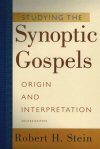
Stein examines the literary relationships of the Synoptic Gospels, the preliterary history of the oral traditions of Jesus, and the canonization of the gospel traditions. This text is an essential resource for teachers and students, providing a succinct, lucid, and comprehensive introduction to the most complex problems of interpreting the gospels.
This book is highly recommended for all students of the Gospels, but especially for those entrusted with the exposition and proclamation of the Word.
—David A. deSilva, Ashland Theological Journal
Robert H. Stein was senior professor of New Testament interpretation at Southern Baptist Theological Seminary. He previously taught at Bethel Seminary. A world-renowned scholar of the Synoptic Gospels, he is the author of several books, including Jesus the Messiah, Mark in the Baker Exegetical Commentary on the New Testament series, and Luke in the New American Commentary series.
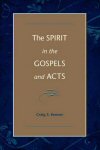
Carefully mine the New Testament gospels and the book of Acts to understand what the Holy Spirit meant in the lives of early believers with Craig Keener. Christianity did not arise in a vacuum, but rather it appropriated, modified, and utilized the Jewish understanding of the work of the Holy Spirit. By understanding the world in which Christianity emerged, we can better understand the earliest believers’ experience of God’s empowering and purifying Spirit.
Keener handles both the biblical text and extra-biblical sources carefully and even-handedly. He refers consistently to primary sources, and he has included extensive bibliographical resources and indexes.
—John D. Harvey, Journal of the Evangelical Theological Society
Craig S. Keener is professor of New Testament at Asbury Theological Seminary in Wilmore, Kentucky. He is the author of many books, including Miracles: The Credibility of the New Testament Accounts, The IVP Bible Background Commentary: New Testament, The Historical Jesus of the Gospels, Gift and Giver, and commentaries on Acts, Matthew, John, Romans, 1–2 Corinthians, and Revelation.
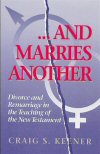
Carefully documented and compassionate, this book explores how early Christians would have understood the statements of Jesus and Paul on divorce and remarriage. Keener then builds a soundly scriptural view of divorce and remarriage—a view that reminds the church that all of its members are forgiven people.
A first-rate piece of pastoral scholarship.
—Gordon D. Fee, professor of New Testament, Regent College
Craig S. Keener is professor of New Testament at Asbury Theological Seminary in Wilmore, Kentucky. He is the author of many books, including Miracles: The Credibility of the New Testament Accounts, The IVP Bible Background Commentary: New Testament, The Historical Jesus of the Gospels, Gift and Giver, and commentaries on Acts, Matthew, John, Romans, 1–2 Corinthians, and Revelation.
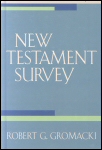
Before coming to grips with an individual verse or passage in the New Testament, Bible students and expositors must understand how it relates to the theme of the book. Robert Gromacki’s New Testament Survey provides a solid foundation for in-depth exegesis of each book in the New Testament.
“The purpose of [this] survey,” the author writes, “is to give a working understanding of the message of the New Testament books. . . . My goal has been to make the complex simple and to say much in few words.”
This text represents a true survey. It provides an introduction to the New Testament, free of technical discussion. It incorporates historical and cultural backgrounds without becoming a book on manners and customs, and it deals with the actual text of Scripture without becoming a verse-by-verse commentary. This balanced presentation avoids skimming the surface or getting bogged down in insignificant details.
The first chapter explores the first-century historical background, social and economic conditions, Gentile religions and philosophies, and Judaistic practices. In the next two chapters, the author discusses the entire New Testament corpus as a whole and the Gospels in particular.
The remaining 27 chapters cover each of the New Testament books. After presenting introductory data for each book, Gromacki provides a detailed outline and a summary commentary. Each chapter concludes with an “Increase Your Learning” section, which presents both individual projects and topics for further discussion. A list of recommended commentaries follows.
Robert G. Gromacki is a distinguished professor of Bible and Greek at Cedarville University. He has written expositions of eight New Testament books, including 1 Corinthians, Galatians, Philippians, and Hebrews. He is also a contributing author to Understanding Christian Theology.
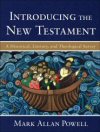
This beautifully written and absorbing survey offers an up-to-date New Testament introduction for undergraduate students and general readers. Powell presents disputed and controversial issues fairly, neither dictating conclusions nor privileging skepticism over faith-based perspectives. The book is written in a lively and engaging style and includes maps, tables, charts, glossary, diagrams, and suggestions for further reading.
In this engaging and up-to-date New Testament introduction, Mark Allan Powell presents disputed and controversial issues fairly, neither dictating conclusions nor privileging skepticism over faith-based perspectives. A recognized expert in New Testament scholarly literature, he nevertheless writes in a lively and lucid style that communicates well to undergraduates.
Drawing on several decades of effective classroom teaching, Powell has produced the quintessential ‘user-friendly’ introduction to the New Testament. He has put student and teacher alike in his debt.
—Mikeal C. Parsons, professor and Macon Chair in Religion, Baylor University
Mark Allen Powell is the Robert and Phyllis Leatherman Professor of New Testament at Trinity Lutheran Seminary. He is the general editor of the HarperCollins Bible Dictionary as well as the author of numerous articles and books.
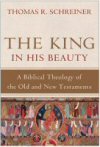
The King in His Beauty: A Biblical Theology of the Old and New Testaments
- Author: Thomas R. Schreiner
- Publication Date: 2013
- Pages: 736
Thomas Schreiner, a respected scholar and trusted voice for many students and pastors, offers a substantial and accessibly written overview of the whole Bible. He traces the storyline of the Scriptures from the standpoint of biblical theology, examining the overarching message that is conveyed throughout. Schreiner emphasizes three interrelated and unified themes that stand out in the biblical narrative: God as Lord, human beings as those who are made in God’s image, and the land or place in which God’s rule is exercised. The goal of God’s kingdom is to see the king in his beauty and to be enraptured in his glory.
A wonderfully clear and faithful account of biblical theology. This book is both intellectually compelling and honoring to God and so deserves to be widely read.
—Simon Gathercole, senior lecturer in New Testament, University of Cambridge
Thomas R. Schreiner (PhD, Fuller Theological Seminary) is James Buchanan Harrison Professor of New Testament interpretation at Southern Baptist Theological Seminary in Louisville, Kentucky. He is the author or editor of numerous books and many articles on New Testament interpretation and biblical theology. He also serves as preaching pastor of Clifton Baptist Church in Louisville, Kentucky.
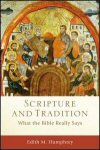
This book sheds new light on the historical tension between Scripture and tradition in the Church. Prominent New Testament scholar Edith M. Humphrey, who understands the issue from both Protestant and Catholic/Orthodox perspectives, revisits this perennial point of tension. She demonstrates that the Bible itself reveals the importance of Tradition, exploring how the Gospels, Acts, and the Epistles show Jesus and the apostles claiming the authority of tradition as God’s Word, both written and spoken. Arguing that Scripture and tradition are not in opposition but are necessarily and inextricably intertwined, Humphrey defends tradition as God’s gift to the Church. She also works to dismantle rigid views of Sola Scriptura while holding a high view of Scripture’s authority.
In Scripture and Tradition, Edith Humphrey provides an intelligent and nuanced way forward, past the stifling oppositions that have dominated the discussions on Scripture and tradition in the recent past. Fusing personal reflection with an excellently articulated and accessible argument, Humphrey shows us how the narrative character of the Christian faith and life mandates that we live in tradition, rejecting the trappings of traditionalism. For as Jaroslav Pelikan noted many years ago, ‘Tradition is the living faith of the dead; traditionalism is the dead faith of the living.’
—George Kalantzis, associate professor of theology, Wheaton College; director, The Wheaton Center for Early Christian Studies
Edith M. Humphrey (PhD, McGill University) is the William F. Orr Professor of New Testament at Pittsburgh Theological Seminary in Pittsburgh, Pennsylvania. She is the author of several books, including Joseph and Aseneth, And I Turned to See the Voice: Rhetoric of Vision in the New Testament, which appears in the Baker Academic Theological Interpretation Collection, and Ecstasy and Intimacy: When the Holy Spirit Meets the Human Spirit. She has also authored numerous articles on the literary and rhetorical study of the Bible.
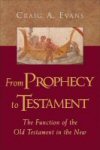
The theology of the New Testament is indebted to—and a reflection of—major Old Testament themes, images, and language, because the New Testament authors wrote in the context of the Old Testament and the rich Jewish tradition of the study and interpretation of Scripture.
A group of ancient Jewish writers provided the Christian church with its Old Testament Greek text (the Septuagint) and provided Aramaic translations (the Targums) for some of the writers of the New Testament. This group also produced many works that, whether intentionally or not, offered interpretations, expansions, and explanations of difficult or obscure Old Testament passages that influenced the New Testament authors.
From Prophecy to Testament opens with a basic overview of past work on the development of New Testament theology, then offers a superb collection of essays exploring the numerous ways in which New Testament writers were informed by the biblical and extrabiblical literature of the Second-Temple period.
Contributors
- Bruce Chilton
- Craig A. Evans
- Rikk E. Watts
- Robert F. Shedinger
- Simon J. Gathercole
- Michael Labahn
- A.J. Droge
- James C. VanderKam
- James L. Kugel
- Brigitte Kahl
- Gary A. Anderson
- James A. Sanders
The study of the influence and use of the Old Testament in the New Testament gains immeasurably in depth when we appreciate that the texts and traditions involved weren’t fixed or static but living, in dynamic interaction with the generations that pondered their words. This book and its various surveys, probes, and well-worked case studies will help bring home this insight with renewed force. I commend it warmly.
—James D.G. Dunn, Emeritus Lightfoot Professor of Divinity, University of Durham
Craig A. Evans is the Payzant Distinguished Professor of New Testament and director of the graduate program at Acadia Divinity College in Wolfville, Nova Scotia. He has received degrees from Claremont McKenna College, Western Baptist Seminary, and Claremont Graduate University. He is a frequent contributor to scholarly journals and the author or editor of numerous publications, including Jesus and the Ossuaries, Ancient Texts for New Testament Studies, Fabricating Jesus, and To See and Not Perceive.
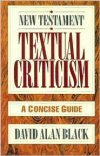
Which translation of the New Testament carries the most authority? What are the criteria for evaluation? This beginner’s introduction presents the fundamentals of textual criticism in a concise manner and includes case studies to offer the student helpful examples. It is dedicated to the principle that an understanding of this subject is possible for all students of the Bible. David Alan Black aims to take inquirers behind the dust of scholarship to the living faith that pulsates in the New Testament documents. He attempts to make the findings of scholarship accessible to a wide readership. Pastors and laypersons will especially benefit from this volume.
The best concise introduction to the textual critical study of the Greek New Testament.
—Fuller Theological Seminary Bookstore
David Alan Black (DTh, University of Basel) is professor of New Testament and Greek at Southeastern Baptist Theological Seminary.
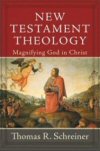
While no single New Testament document claims to offer a comprehensive theology, Thomas Schreiner suggests that certain recurring themes emerge from the study of the whole. In this volume, he traces key themes as they appear throughout the New Testament canon, exploring the emphases that emerge from a detailed reading of the texts.
Schreiner’s approach is based on solid exegesis of all the key texts and leads him to a unified view of core New Testament teaching. He focuses particularly on two overarching themes. The first concerns the unity of redemptive history and the kingdom of God. The New Testament takes up Old Testament imagery and affirms that the kingdom has come (although it remains unfulfilled) in Jesus Christ. The second related theme concerns the goal of the kingdom—the glory of God through the work of Christ and the empowering presence of the Spirit. In the second half of the work, Schreiner takes up the question of what these themes mean for the life of the believer and the ministry of the community of faith. Although this substantial and comprehensive volume will be of great interest to scholars, Schreiner’s first concern is to provide an accessible guide for students and pastors. He has succeeded admirably, and readers will find here a lucid exposition of the theology of the New Testament.
Thomas R. Schreiner is professor of New Testament interpretation at Southern Baptist Theological Seminary. He is the author of Romans in the Baker Exegetical Commentary on the New Testament (BECNT) (16 vols.).
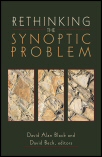
The problematic literary relationship among the Synoptic Gospels has given rise to numerous theories of authorship and priority. The primary objective of Rethinking the Synoptic Problem is to familiarize students with the main positions held by New Testament scholars in this much-debated area of research.
The contributors to this volume, all leading biblical scholars, highlight current academic trends within New Testament scholarship and update evangelical understandings of the Synoptic Problem.
An exciting and readable overview of the present state of the Synoptic problem. The entries are balanced, probing, and incisive, making the volume a valuable introduction for all who would learn more about the knotty but inescapable enigma at the heart of the Gospels.
—David Dungan, former emeritus professor of New Testament and early Christianity, University of Tennessee
David Alan Black (DTheol, University of Basel) is a professor of New Testament and Greek at Southeastern Baptist Theological Seminary. He is also author of New Testament Textual Criticism: A Concise Guide
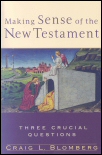
Many Christians assume that the New Testament is historically reliable. This confidence, however, is not universal, and there are many who, especially in light of modern biblical studies, question this claim. Some have also claimed that Paul founded a church quite distinct from the message of Jesus and the Gospels. How can we reconcile their seeming differences? What is the relevance of the New Testament in the world today, in cultures far removed in time and space from the first-century Mediterranean world?
Grounded in sound scholarship but written in an accessible style, this book provides a reasonable, well-informed response to these issues, offering sound introductory guidance to any student of the Bible.
As always, Craig Blomberg is lucid, sensible, and interesting. The book’s organization and style are deceptively simple. Even the mature Christian reader will benefit from Blomberg’s mastery of so much material nicely summarized and evaluated here. Blomberg offers just enough detail to keep us interested in the hard evidence but not so much as to make us feel swamped by minutiae. This book could be confidently placed into the hands of friends who are generally well read but who are nevertheless biblically illiterate, for Blomberg’s mix of sane historical assessment, thoughtful theology, and elementary principles of interpretation open many doors. I hope this book will find many diverse readers and a long life.
—D.A. Carson, research professor, Trinity Evangelical Divinity School
Craig L. Blomberg (PhD, University of Aberdeen) is a distinguished professor of New Testament at Denver Seminary, where he has taught for more than 15 years. He is the author or editor of more than 10 books, including Jesus and the Gospels and Interpreting the Parables.

Throughout Christian history, the Gospel of John’s distinctive way of presenting the life, works, teachings, death, and resurrection of Jesus have earned it labels such as “the spiritual Gospel” and “the maverick Gospel.” In this volume, leading biblical scholar Richard Bauckham illuminates main theological themes in the Gospel of John, providing insightful analysis of key texts.
Some of the themes Bauckham addresses have been neglected, and others have been debated during the past century of New Testament scholarship. Bauckham sheds light on the individualism apparent in John’s portrayal of the believer’s relationship to Jesus, how Jesus reveals God’s glory, John’s understanding of the key events in his Christological story, the background and significance of John’s dualistic language, and how John’s language evokes multiple meanings without negating the literal sense of his narrative. A concluding chapter explores the significance of the differences between John and the other Gospels. This compact volume is an ideal supplemental text in a course on John or the four Gospels. Gospel of Glory will also serve New Testament scholars and theologians as a reexamination of the Fourth Gospel by a master of their guild.
Bauckham offers a series of probing essays on the Gospel of John and its theology. They display the qualities that mark all of Bauckham’s scholarship: a mastery of the field, an attention to exegetical detail, theological sophistication, and an independent judgment in constructive dialogue with an impressive array of Johannine scholars. Written in an accessible way, these essays will introduce Bauckham to those who do not know his work as they continue his stimulating contribution to the conversation about the elusive but engaging Gospel of John.
—Harold W. Attridge, Sterling Professor of Divinity, Yale Divinity School
Richard Bauckham is senior scholar at Ridley Hall, Cambridge, where he teaches for the Cambridge Federation of Theological Colleges. He is also a visiting professor at St. Mellitus College, London, and emeritus professor of New Testament at the University of St. Andrews. He is a fellow of the British Academy and the author of numerous books, including The Testimony of the Beloved Disciple, The Jewish World around the New Testament, The Bible in Politics, Jesus and the Eyewitnesses, and a volume on Jude and 2 Peter in the Word Biblical Commentary (WBC) (61 vols.).

This substantial, reliable introduction examines the character and purpose of Luke and Acts and provides a thorough yet economical treatment of Luke’s social, historical, and literary context. Karl Allen Kuhn presents Luke’s narrative as a "kingdom story" that both announces the arrival of God’s reign in Jesus and describes the ministry of the early church, revealing the character of the kingdom as dramatically at odds with the kingdom of Rome. Kuhn explores the background, literary features, plotting, and themes of Luke and Acts but also offers significant, fresh insights into the persuasive force of Luke’s well crafted and rhetorically charged narrative.
Kuhn provides a rich introduction to Luke’s two-volume work, carefully unraveling its thick, interwoven tapestry of literary patterns, rhetorical strategies, social networks, political tensions, and theological themes.
—F. Scott Spencer, professor of New Testament and biblical interpretation, Baptist Theological Seminary at Richmond
Karl Allen Kuhn is professor of religion at Lakeland College in Plymouth, Wisconsin. He is the author of Having Words with God: The Bible as Conversation, The Heart of Biblical Narrative: Rediscovering Biblical Appeal to the Emotions, and Luke: The Elite Evangelist.

Repentance and conversion are key topics in New Testament interpretation and in Christian life. However, the study of conversion in early Christianity has been plagued by psychological assumptions alien to the world of the New Testament. Leading New Testament scholar Joel Green believes that careful attention to the narrative of Luke-Acts calls for significant rethinking about the nature of Christian conversion. Drawing on the cognitive sciences and examining key evidence in Luke-Acts, this book emphasizes the embodied nature of human life as it explores the life transformation signaled by the message of conversion, offering a new reading of a key aspect of New Testament theology.
Joel Green offers a provocative and uncommonly helpful analysis of a subject that has become increasingly important. This challenging topic requires command of multiple disciplines, and Green draws skillfully and wisely from an array of exegetical methods and the cognitive sciences.
—John T. Carroll, Harriet Robertson Fitts Professor of New Testament, Union Presbyterian Seminary, Richmond, Virginia
Joel B. Green is the dean of the School of Theology, professor of New Testament interpretation, and associate dean for the Center for Advanced Theological Studies at Fuller Theological Seminary in Pasadena, California. He is the author or editor of numerous books, including the Dictionary of Scripture and Ethics, the Dictionary of Jesus and the Gospels, 2nd ed., The World of the New Testament: Cultural, Social, and Historical Contexts, Hearing the New Testament: Strategies for Interpretation, 2nd ed., and commentaries on Luke and 1 Peter. He is also editor-in-chief of the Journal of Theological Interpretation.